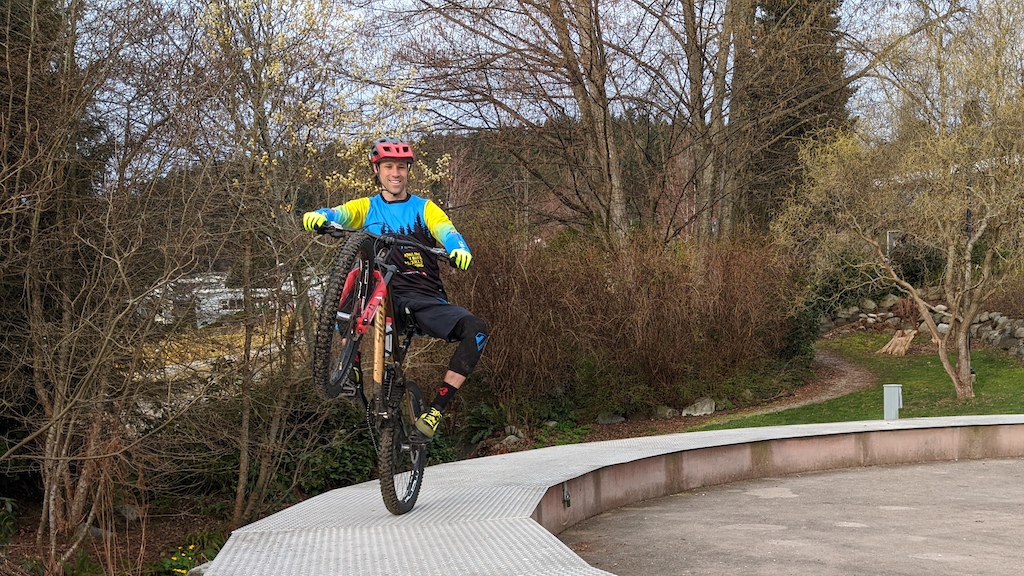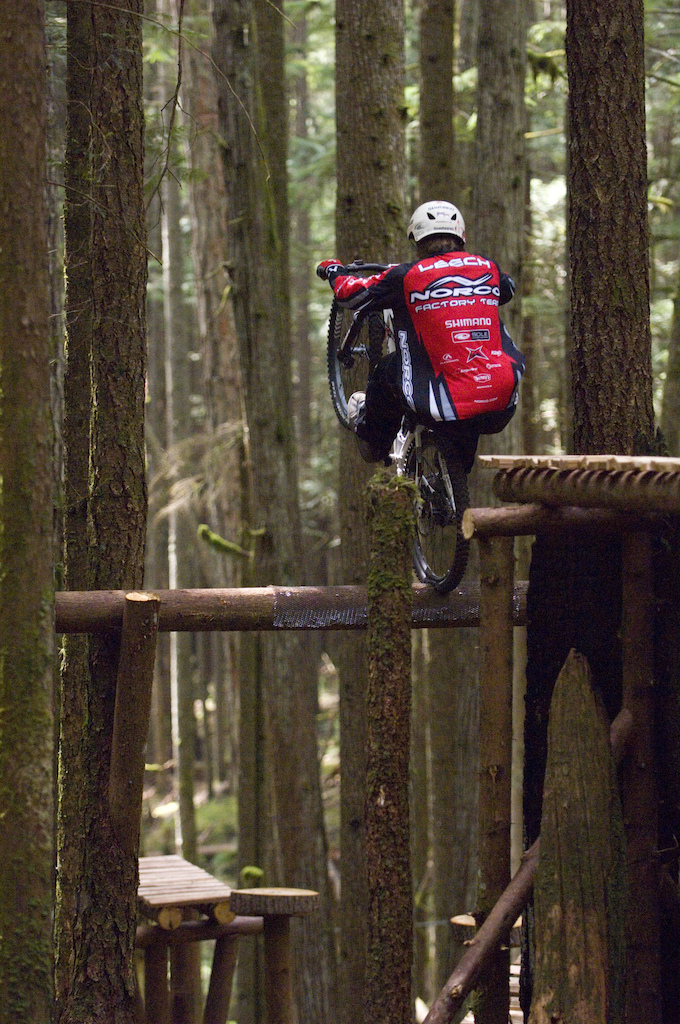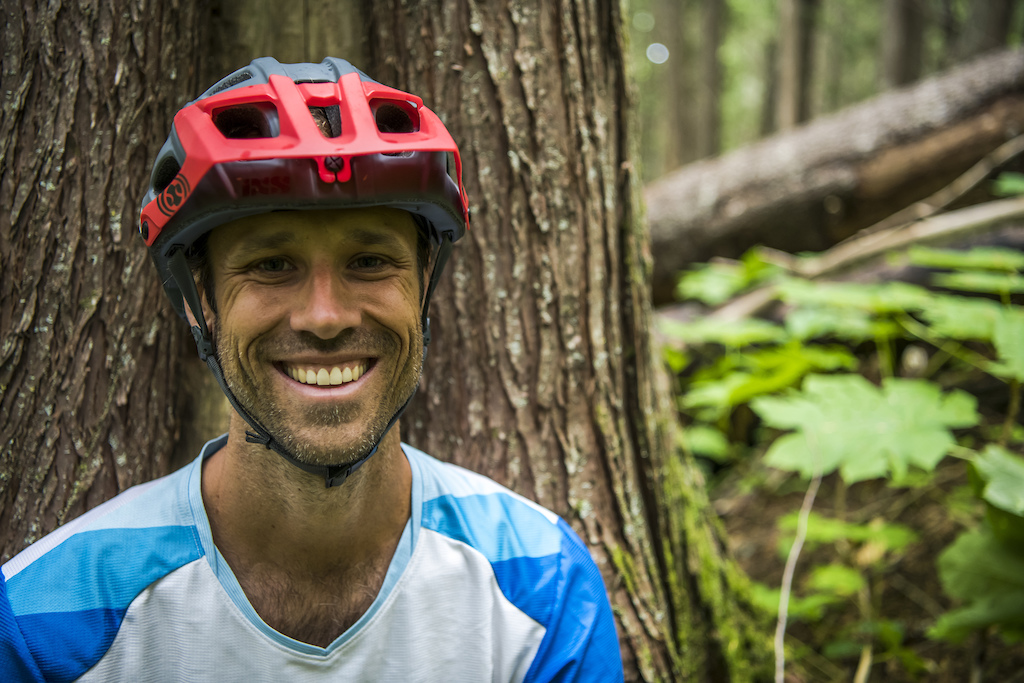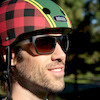5 Tips from Ryan Leech to Help You Practice Like a Trials Rider
Words by Ryan Leech
It seems unanimous - trials riders are wizards on technical trails - we also ‘have a knack’ for learning non-trials mtb skills quickly. Why? There is a unique culture of practice in the trials riding community that most mountain bikers aren’t exposed to or aware of. I’d love to see these strategies and mindsets spread deeper into the mountain bike world, so I have summarized five of the key elements for you to consider. For reference, I’ve been a professional trials rider since 1997, and a coach for almost as long.
1. Go Local
Give me a curb and a bike and I can keep myself entertained for hours. There are endless skills and drills that can be practiced within minutes of your door, no matter where you live - just jump on your bike and go play! This goes against the general belief that a ride requires a big chunk of time which includes driving to the trailhead - for busy lives this means just one or two rides a week, if lucky. Trials riders however know that they only need 20 minutes to get a quick session in. These short rides don’t require a trials bike either - your full suspension will work just fine - just rip to the park to practice cornering on the grass, drops on the retaining wall, bunny hops up the curb, or manuals down the street - the list goes on!
2. Session
If a mountain biker passes a challenging section of trail, they generally walk, or try it once before moving on to ride more trail. A trials rider, however, will stop and session that challenge for as long as it takes to perfect it - or at least to make progress. My friend Jeff Lenosky, aka the Trail Boss, said it well:
"Most riders who mess up an obstacle will just continue on. If you ride that trail once a week it could take months to sort out that tricky section as opposed to a 30 minute session where you can take 10 or 20 tries, which is what trials riders do." - Jeff Lenosky
Or as popular IG’er @ddangerousdave says:
"I've noticed there's less of a session culture in mountain biking. A challenging line is seen as part of the ride, something to be attempted a few times or walked, whereas I'll session it until it's dialed. The feature becomes the ride." - Dave Herr
This change of approach is easier said than done. Many trails are too busy these days so it’s dangerous to hike up and down to practice a feature, so choose your session feature wisely. Secondly, ‘sessioning’ isn’t part of the culture, especially when riding with friends. If your riding buddies aren’t into it, they may become impatient - so be clear before the ride that your intention is to practice and progress rather than logging an extra trail or two on Strava.
3. High Definition Visualization
Partly due to the fact that trials riders session, we get infatuated with conquering individual skills or features, and will repetitively practice them not only in real life, but in our minds eye as well. This mental imagery is a skill and with practice we’re able to conjure high definition visualizations and scenarios so that we can test out different movements to see what works and what doesn’t - all without the physical risk and toll. This can be done on location during a practice session or in any spare moment during your day - these visualization skills give us a huge advantage. Popular trials youtuber Ali Carlkson shares:
"For me half the battle is mental, I almost never physically try a trick/move/line if I haven’t already mastered it in my head. Of course mentally conquering something doesn’t always translate to reality, however for the most part conquering moves mentally can give me more confidence to try and increase the chance of success, even if it takes many attempts for my body to catch up."
Additionally, gathering raw ‘feeling’ data while riding rather than just ‘thinking’ data is important. It adds fuel to your visualization, you can weave in these experiential feelings while practicing in your head. My long time trials friend at Cirque du Soleil shares:
"I've noticed over the years that I start out with a mental picture of a new skill and how I think it's gonna feel. Sometimes this works well but not always. When I'm not figuring things out I switch to a more intuitive approach and try to feel rather than think. Going with sensory input has helped me make progress on a number of skills that had me struggling." -Lance Trappe
Visualization is a deep topic, and is chronically under utilized in the recreational mountain bike world. I’ll be speaking more deeply on these five strategies in an upcoming webinar and hope you can join. These are such fascinating and fun topics to explore and integrate no matter what level your riding is at.
4. Creative Play
Trials riders are problem solvers - kind of like rock climbers. We’re constantly seeking the best or most enjoyable way to navigate challenging obstacles and terrain, whether a boulder, a railing, a log or interesting urban architecture. We take the skills we have and apply them in playful ways to the terrain - and we take this same approach to the trail.
The line of least resistance is generally not the one a trials rider takes - the trail gives us a general route, and any time we can find a better, more stylish or enjoyable line we take it. This approach allows us to be constantly challenged - even on a flat bit of trail we end up pulling a manual or carving mini turns - packing as much fun into every inch of trail as possible - we’re in charge and riding the trail vs the trail riding us.
5. Conscious Repetition
During a practice session I’ll happily try the same move over and over. To an observer, it appears I’m making the same mistake. Popular psychology says be careful not to engrain these failures into your memory - but when you’re conscious, that’s not what’s happening. Similar to Lance's quote above, trials riders are hyper aware of every micro nuance, they can feel the slightest variation between attempts and each try is a new opportunity to feel something you’ve done right, and/or feel something you’ve done wrong. I asked a trials riding friend who is also a sports psychologist to comment on this:
"Due to the nature of the sport, trials riders typically engage in 'deliberate blocked practice'. That is purposeful repetitions of a certain action with focused attention on specific improvements in performance. Indeed, some mountain bikers also do this when they 'session' a corner, jump, or line. However, the 'typical mountain biker' engages more in 'random practice', That is, they log miles on the trail and thus practice a vast variety of skills (riding berms, roots, drops, flat turns etc.) in the random order in which the trail presents them but without the focused repetition of deliberate practice." -Dr. Matt Barlow
Trials riders look at the micro level and are not concerned about the end result. Say I try a manual 100 times, and on that 100th attempt I finally felt a small variation that correlated to a positive result. I’ll then continue practicing until I can repeat that same result, and if it takes 95 times to do that, then I’m making progress and stay motivated. Most riders however will give up after a few tries, let alone 100! Trials riders are willing to continue this cycle until that positive result requires only 80 attempts, then 30, etc, and will mesh that result with a stack of other ‘right feelings’ and results until the move is dialed. A world champ trials rider can attest:
"First thing is definitely hard work and lots and lots of tries to master a new skill. I like to try it as much and as hard as I can and then take a little break off the bike. In this time off your mind body connection will sort this data and you’ll see ... next time you ride, you’ll see progression!" -Kenny Belay
It’s not that most riders don’t have enough patience, it’s just that most riders don’t give themselves enough time to experience the addictive benefits and results of sticking with it - and thus don’t get to develop their patience skill. Like most things, patience is built. It’s a muscle.
Conclusion
My primary hope is that this article encourages you to spend more time on your bike between trail rides, and more time sessioning challenges while on trail rides. If you can mix in some visualization practice and develop more nuanced bike-body-mind awareness during your repetitive practice attempts, your skill level will certainly ramp up. The payoff is incredible - with a trials riders’ eye and abilities, every trail ride is filled with creative opportunity and fun.
If you’d like to learn more about each of these topics I’ll be offering an interactive deep-dive webinar on September 29th, and would love to have you join in.
Happy (and safe!) practicing,
Ryan Leech has been a pro rider since 1997, and runs an online mountain bike skills coaching community called RLC-MTB Coaching. https://learn.ryanleech.com/ He’s supported by @shimano Components, @norcobicycles Bicycles, @MarzocchiMTB Suspension, Kenda Tires, and Ryders Eyewear.
Author Info:
Must Read This Week
How to Watch the 2024 Mountain Bike World Cup [Update: Staylive Offering Access in New Zealand, South Africa & More]
60553 views
60553 views
[UPDATED] Final Elite XC Results & Overall Standings from the Mairiporã XC World Cup 2024
41559 views
41559 views
Sign Up for the Pinkbike Newsletter - All the Biggest, Most Interesting Stories in your Inbox
PB Newsletter Signup





 Member since Oct 9, 2007
Member since Oct 9, 2007
The Kranked 6 segment and Roam segment got me fired up back in the day to go ride street and attempt more trialsy moves. Mastering the Art of Trials was also a great investment. I can’t say I ever got better, but I sure did enjoy it up until those pedal pins went into my shins.
www.codeleadmanage.com/books/2021-03-19-The-Little-Book-of-Talent.html
that includes many of these ideas and strategies. I've applied it successfully to my riding and other goals in my life and really recommend it as a quick and easy read. A couple of really applicable recommendations:
* Spartan and humble spaces focus attention on deep-practice. (Ryan's bike and a curb)
* Hard Skills == High Precision while Soft Skills == High Flexibility; you learn and perfect them very differently
* Deep practice is measured in high-quality reaches and repetitions, not time.
* Embrace Repetition; this reinforces skills with biological mechanism for making the wires of our brains faster and more accurate.
and finally, one that I personally have found true but you'll hear equal numbers of experts claim the opposite (YMMV):
* Keep your big goals secret. Sharing goals tricks your brain into thinking you've already accomplished something and then we don't work as hard or long, and it reduces motivation.
Highly recommended reading (or wait for the author's video of photo epic if PB style is your thing!)
It's great for both newbies and experienced riders alike and the combination of the lesson videos, coaches reviewing your practice videos and the live webinars works really well. You normally have feedback within 24 hours on your practice.
For me it's worked much better than in-person coaching because there's so much incremental practice needed to internalise the skills and build the muscle strength, often over a period of weeks, that I found I need what I really needed was someone to check my daily/weekly progress regularly, rather than just spending half a day trying to blast a skill into my brain. I am a slow learner though and by no means a natural athlete, YMMV with 1:1 coaching!
If you've reached your limit of hearing "you just need to make an L-shape" then this is the next level up.
20 years ago when I popped in a VHS and saw you in Revolution, (I think it was, been 20 years) and seeing Manifesto was a life changing experience that sparked my love for trials. I bought Mastering the Art of Trials when that launched and l still reference that video for new riders looking to progress, and for myself; because 20 years later, Im still needing a little advice with advanced moves.
I got to meet you once at interbike about 15 years ago and that made my entire trip was just meeting the legend, and the man that changed my life. I've used your inspiration, advice, yoga, breathing, and just overall being one of the kindest riders on the planet into my own life.
I get new riders stoked seeing trials, and will always help them. Ive built trials bikes for local kids who showed a passion for trials, and figured out a pedal kick in no time. Their families not having tons of cash for trials rigs, I rallied up some of the trials riders around the state to donate parts to me so I could build trials bikes for local kids .
I really just want to give you a shout for everything over the years- all from a short movie called Manifesto.
Can definitely say that riding "street" with trials inspiration adds immensely to trail/dh skills.
Loving all your articles (and your online coaching site) as they add so much depth to mountain biking.
Nowadays most people want to be able to “do” a skill, but they forget that you need to bring the same enthusiasm for the LEARNING experience, to get there.
Wanting to have something is not the same as actually looking forward to doing something to achieve it
And this article highlights how much actual practice is required to become awesome as a rider.
What we can definitely learn from trials riders is:
1. Practicing LOTS of basic maneuvers first to have solid fundamentals
2. Doing many repetitions and doing these off the trail
3. Practicing deliberately and not randomly
4. And then taking these skills to the trail and sessioning sections there, too!
Thank you for this great reminder
Ryan has been one of my role models since the 90s.
For me progression is not just going bigger and faster but add more refinement and elegance to the way I tackle a trail.
There is a culture to go big at my local trails but I can get as much enjoyment out of the little things: a quick 180 or nose pivot on a tight switchback. A nollie drop into a roller. Pedal kicks to tyre tap over a tree trunk. Nose bonking obstacles... manuals into small drops... stuff like that.
This requires a bit of a shift of mind towards when to ride as well.
Ryan's level of mastery doesn't come from loading a bike onto a rack and dropping into a trail once a week.
For us non-pros it means having a bike within arms reach during the day-to-day.
Just hop onto it for a quick 15 minute practice during a lunch break.